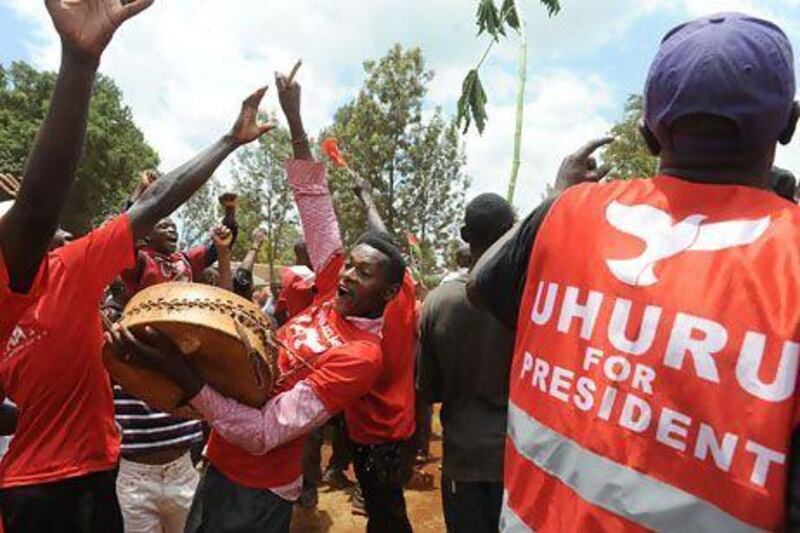NAIROBI // The son of Kenya's founding father, Uhuru Kenyatta, was named the winner of the country's presidential election with 50.07 per cent of the vote yesterday, but his opponent said Kenya's democracy was on trial after what he said were multiple failures in the election's integrity.
Supporters of Mr Kenyatta - a man accused by an international court of helping to orchestrate the vicious violence that marred the nation's last vote - flooded the streets, celebrating in a parade of red, his campaign's colour.
Refusing to concede defeat, prime minister Raila Odinga said the election process experienced multiple failures as he announced plans to petition the Supreme Court. Mr Odinga asked for calm and for Kenyans to love one another, a call that may help prevent a repeat of the 2007-08 violence in which more than 1,000 people were killed and that brought Kenya to the edge of civil war.
Mr Kenyatta's slim margin of victory increases the focus on a multitude of electoral failures that occurred during the six-day voting and counting process. His margin of victory was just 4,099 votes out of 12.3 million cast.
The United States, Britain and the European Union gave Kenya's new political era a chilly reception. All released statements but none mentioned Mr Kenyatta by name. The West had made it clear before the vote that it would not welcome a president Kenyatta.
Mr Kenyatta faces trial in July at the International Criminal Court over allegations he orchestrated the murder, forcible deportation, persecution and rape of Mr Odinga's supporters in the aftermath of the 2007 vote. Mr Kenyatta, as president, may have to spend large chunks of his first years in Kenya's highest office in a courtroom in The Hague.
The United States previously warned of "consequences" if Mr Kenyatta wins, the nature of which depends on what happens in coming months. Britain has said it would have only essential contact with Mr Kenyatta as president.
In his acceptance speech, Mr Kenyatta gave a nod to the ICC, saying he recognises the nation's international obligations. He pledged to continue to cooperate with "international institutions," but he also said he expects the international community to "respect our sovereignty and the democratic will of the people of Kenya."
Mr Kenyatta was immediately afforded the state security for a president-elect, travelling in a shiny black convoy from the tallying centre to his election headquarters. In his speech, he thanked Mr Odinga - calling him "my brother" - for a spirited campaign.
"Today we celebrate the triumph of democracy, the triumph of peace, the triumph of nationhood," he said, adding later: "My pledge to you is that as your president I will work on behalf of all citizens regardless of political affiliation. I will honour the will of Kenyans and ensure that my government protects their rights and acts without fear or favour, in the interests of our nation."
If Mr Kenyatta's victory holds, the son of Jomo Kenyatta will become the fourth president of Kenya since its independence from British colonial rule in 1963.
After the Mr Kenyatta's victory, minor skirmishes were reported, but no major violence was confirmed around Kenya.
Government officials have been working for months to avoid the post-election violence that brought Kenya to the brink of civil war five years ago, when more than 600,000 people were forced from their homes after president Mwai Kibaki - a Kikuyu like Kenyatta - was pronounced the winner over Mr Odinga, a Luo.
Mr Kenyatta's task was not simply to beat Mr Odinga, but to get over the 50 per cent mark and avoid a head-to-head run-off. Eight candidates ran for president. Even if Mr Odinga succeeds in dropping Mr Kenyatta's final numbers below 50 per cent and forces a run-off, he still has a huge gap in votes to make up in a potential second round.
Mr Odinga listed election failures over the last week: a voter ID system was scrapped Monday after the technology failed; a preliminary tally of early returns froze and was scrapped Tuesday after computer servers overloaded; election officials said a computer error had inflated the number of rejected ballots by a factor of eight in the early tallying system.





